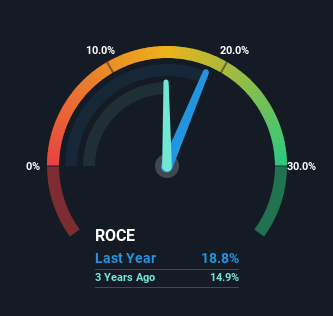Investors Met With Slowing Returns on Capital At Rockwool (CPH:ROCK B)

Finding a business that has the potential to grow substantially is not easy, but it is possible if we look at a few key financial metrics. Typically, we'll want to notice a trend of growing return on capital employed (ROCE) and alongside that, an expanding base of capital employed. Put simply, these types of businesses are compounding machines, meaning they are continually reinvesting their earnings at ever-higher rates of return. So, when we ran our eye over Rockwool's (CPH:ROCK B) trend of ROCE, we liked what we saw.
Return On Capital Employed (ROCE): What Is It?
For those that aren't sure what ROCE is, it measures the amount of pre-tax profits a company can generate from the capital employed in its business. To calculate this metric for Rockwool, this is the formula:
Return on Capital Employed = Earnings Before Interest and Tax (EBIT) ÷ (Total Assets - Current Liabilities)
0.19 = €581m ÷ (€3.7b - €564m) (Based on the trailing twelve months to March 2024).
Thus, Rockwool has an ROCE of 19%. In absolute terms, that's a satisfactory return, but compared to the Building industry average of 11% it's much better.
View our latest analysis for Rockwool

In the above chart we have measured Rockwool's prior ROCE against its prior performance, but the future is arguably more important. If you'd like to see what analysts are forecasting going forward, you should check out our free analyst report for Rockwool .
What Can We Tell From Rockwool's ROCE Trend?
The trend of ROCE doesn't stand out much, but returns on a whole are decent. The company has consistently earned 19% for the last five years, and the capital employed within the business has risen 46% in that time. 19% is a pretty standard return, and it provides some comfort knowing that Rockwool has consistently earned this amount. Over long periods of time, returns like these might not be too exciting, but with consistency they can pay off in terms of share price returns.
The Key Takeaway
In the end, Rockwool has proven its ability to adequately reinvest capital at good rates of return. And long term investors would be thrilled with the 106% return they've received over the last five years. So while the positive underlying trends may be accounted for by investors, we still think this stock is worth looking into further.
If you're still interested in Rockwool it's worth checking out our FREE intrinsic value approximation for ROCK B to see if it's trading at an attractive price in other respects.
For those who like to invest in solid companies, check out this free list of companies with solid balance sheets and high returns on equity.
New: AI Stock Screener & Alerts
Our new AI Stock Screener scans the market every day to uncover opportunities.
• Dividend Powerhouses (3%+ Yield)
• Undervalued Small Caps with Insider Buying
• High growth Tech and AI Companies
Or build your own from over 50 metrics.
Have feedback on this article? Concerned about the content? Get in touch with us directly. Alternatively, email editorial-team (at) simplywallst.com.
This article by Simply Wall St is general in nature. We provide commentary based on historical data and analyst forecasts only using an unbiased methodology and our articles are not intended to be financial advice. It does not constitute a recommendation to buy or sell any stock, and does not take account of your objectives, or your financial situation. We aim to bring you long-term focused analysis driven by fundamental data. Note that our analysis may not factor in the latest price-sensitive company announcements or qualitative material. Simply Wall St has no position in any stocks mentioned.
Have feedback on this article? Concerned about the content? Get in touch with us directly. Alternatively, email editorial-team@simplywallst.com
About CPSE:ROCK B
Rockwool
Produces and sells stone wool insulation products in Western Europe, Eastern Europe, Russia, North America, Asia, and internationally.
Solid track record with excellent balance sheet and pays a dividend.
Similar Companies
Market Insights
Community Narratives



